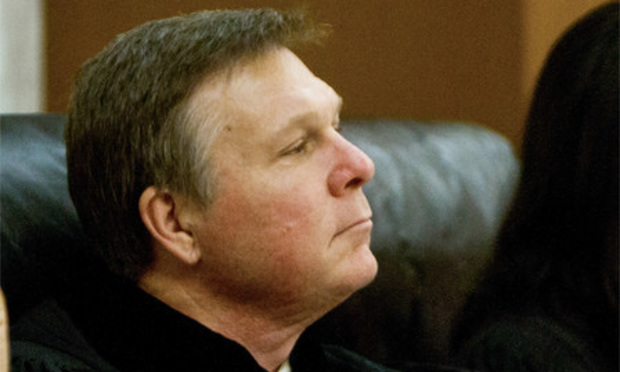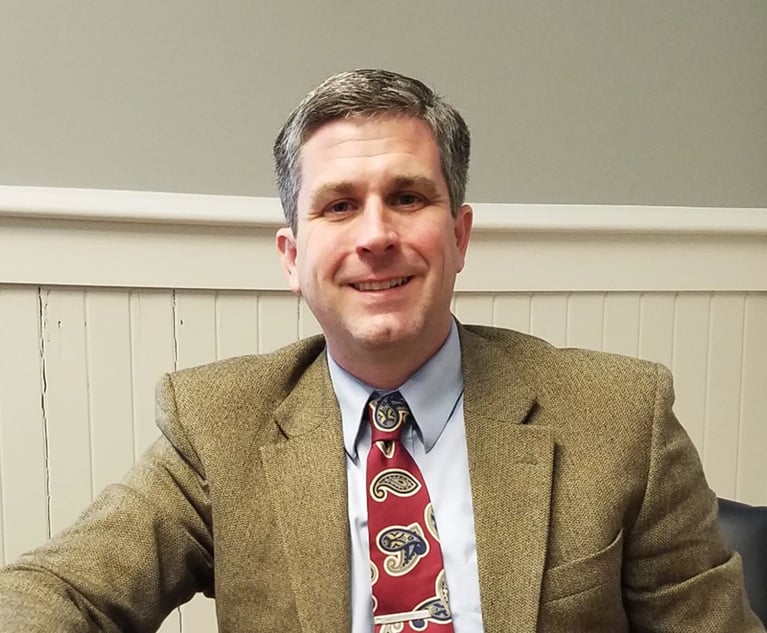Appeals Court: Judge Must Follow the Law on Sealing Old Pot Arrest, Like It or Not
Bulloch County Superior Court Judge F. Gates Peed knew his refusal to consider the underlying arguments was "not the law" when he refused to seal a man's expunged record.
September 10, 2018 at 02:54 PM
7 minute read
 Judge John Ellington, Georgia Court of Appeals (Photo: John Disney/ALM)
Judge John Ellington, Georgia Court of Appeals (Photo: John Disney/ALM)
The Georgia Court of Appeals cited several reasons for reversing a Bulloch County judge who refused to seal a criminal record for a youthful marijuana arrest after the defendant went on to lead a crime-free life and advance his education and career.
But a key reason the appeals court offered for the decision was supplied by Bulloch County Superior Court Judge F. Gates Peed himself, who said in open court that he had no intention of following legally required steps before deciding whether to seal the records.
“I know that's not the law,” Peed is quoted as saying, going on to express his “frustration with the legislative process” and complain about lawmakers' conflicting goals in passing laws.
Peed was apparently miffed with a change in the statute that allowed the defendant to request sealing when the same Legislature authorized the offense and codified access to criminal records in the interest of transparency.
An appellate brief for the John Doe defendant said in “the final analysis, the trial court believed that the new record restriction law on which [Doe's] petition was based was the product of 'the law of unintended consequences'—that is, the product of tough-on-crime legislation by 'legislators … running for re-election so they could run home and beat their chest about we're tough on crime.'”
Frustration notwithstanding, the appellate panel said Peed abused his discretion and ordered the records sealed.
The opinion was written by Presiding Judge John Ellington with the concurrence of Judges Charlie Bethel and Elizabeth Gobeil.
“My client is relieved that he can seal his court record and put a youthful indiscretion behind him,” said defense attorney Jeffrey Filipovits, lamenting the time and expense it took to resolve the case that began with an arrest 15 years ago.
“The state raised arguments that were clearly waived and took a narrow and dismissive view of the harm faced by individuals like my client,” Filipovits said. “Hopefully now more people can make use of this statute, but it should never have been the subject of litigation in the first place.”
Neither Peed nor Ogeechee Circuit District Attorney Richard Mallard responded to requests for comment by deadline.
As detailed in the appellate opinion and other filings, the anonymous defendant was a 20-year-old college student in 2003 when he was arrested by Bulloch County sheriff's deputies and charged with marijuana possession.
Doe entered a negotiated guilty plea and was sentenced to probation subject to conditional discharge without conviction under the First Offender Act. In 2008, the trial court ordered a discharge without conviction, he requested that his record be expunged, and the district attorney approved.
In 2013, the General Assembly amended the law so criminal records maintained by the Georgia Criminal Information Center would be automatically restricted from public access for cases ending in nonconviction.
The law also mandated that restricted records on file with the clerk of the court could be sealed if a judge “finds by a preponderance of the evidence that 'the harm otherwise resulting to the privacy of the individual clearly outweighs the public interest in the criminal history record information being publicly available.'”
Doe, who filed a motion to seal the same year, showed he had not reoffended and earned a college degree and two specialized advanced certificates in the field of finance.
In 2014, the trial court denied his petition, and he filed a motion for reconsideration. The court denied that motion as well, “reciting without elaboration that 'the harm otherwise resulting to the privacy of the individual is not outweighed by the public interest in the criminal history being publicly available.”
In 2015, Doe renewed his petition to seal his record.
At a hearing, Peed expressed his frustration with the law and lawmakers' “piecemeal” efforts to address the unintended consequences of their actions, “like criminalizing many drug offenses and providing for first offender treatment, leaving the courts to sort out the contradictions,” Ellington wrote.
Mallard's office presented no evidence at the hearing “and conceded the truth of the facts Doe presented. The state argued that Doe 'got everything he negotiated for' in the underlying prosecution and that, although the statutory remedy of sealing court records was not codified until later, Doe could have requested that remedy 'as part of his negotiation back in '06.'”
Peed again denied Doe's petition.
The state raised several jurisdictional and procedural issues on appeal, which Ellington's opinion dispatched in short order before reaching Doe's argument that Peed abused his discretion by “refusing to apply the statutory balancing test due to its stated disagreement with the law and the policy behind it.”
“It is well settled that it is an abuse of a trial court's discretion to refuse to exercise its discretion when required, as is the case when the trial court must weigh the benefits of a proposed judicial action against the harms,” Ellington wrote.
The opinion noted Doe presented evidence showing he lost one job with a major financial company when his marijuana charge was discovered.
The law generally favors the “regularity of all proceedings in a court of competent jurisdiction, and a trial court's written order prevails over any oral conclusions made by a judge during a hearing,” the opinion said.
“The views expressed by the trial judge from the bench … however, clearly show that the trial court was disinclined to weigh the public's interest in access to Doe's court record in particular against the harm to his privacy, because the trial judge favored the transparency of criminal records in general, while acknowledging that the court's views were 'not the law.'
“Of course, it is the Legislature's function and authority to decide public policy and to implement that policy by enacting laws, and the courts are bound to follow such laws, if constitutional, despite any contrary personal policy preferences.”
A special concurrence penned by Bethel and joined by Gobeil sought to “emphasize” that the sealing law “charges the trial court with making a factual finding, not a policy judgment.”
“The trial court's expression of its views on the wisdom of Georgia's sentencing and record restriction laws suggests an intention to deviate from the codified policy of our shared state in considering Doe's motion,” Bethel wrote. “We judges are not allowed to do that.”
Doe's attorney said he is still baffled by the prosecution's resistance to the sealing petition.
“I have tried to see it from the state's perspective, but I can't,” he said. “We should be moving toward decriminalization and legalization like other states, not fighting over whether someone who was caught with marijuana over 10 years ago can seal a court record after a conditional discharge.”
This content has been archived. It is available through our partners, LexisNexis® and Bloomberg Law.
To view this content, please continue to their sites.
Not a Lexis Subscriber?
Subscribe Now
Not a Bloomberg Law Subscriber?
Subscribe Now
NOT FOR REPRINT
© 2025 ALM Global, LLC, All Rights Reserved. Request academic re-use from www.copyright.com. All other uses, submit a request to [email protected]. For more information visit Asset & Logo Licensing.
You Might Like
View All

DC Lawsuits Seek to Prevent Mass Firings and Public Naming of FBI Agents
3 minute read

Apply Now: Superior Court Judge Sought for Mountain Judicial Circuit Bench
3 minute readTrending Stories
- 1States Accuse Trump of Thwarting Court's Funding Restoration Order
- 2Microsoft Becomes Latest Tech Company to Face Claims of Stealing Marketing Commissions From Influencers
- 3Coral Gables Attorney Busted for Stalking Lawyer
- 4Trump's DOJ Delays Releasing Jan. 6 FBI Agents List Under Consent Order
- 5Securities Report Says That 2024 Settlements Passed a Total of $5.2B
Who Got The Work
J. Brugh Lower of Gibbons has entered an appearance for industrial equipment supplier Devco Corporation in a pending trademark infringement lawsuit. The suit, accusing the defendant of selling knock-off Graco products, was filed Dec. 18 in New Jersey District Court by Rivkin Radler on behalf of Graco Inc. and Graco Minnesota. The case, assigned to U.S. District Judge Zahid N. Quraishi, is 3:24-cv-11294, Graco Inc. et al v. Devco Corporation.
Who Got The Work
Rebecca Maller-Stein and Kent A. Yalowitz of Arnold & Porter Kaye Scholer have entered their appearances for Hanaco Venture Capital and its executives, Lior Prosor and David Frankel, in a pending securities lawsuit. The action, filed on Dec. 24 in New York Southern District Court by Zell, Aron & Co. on behalf of Goldeneye Advisors, accuses the defendants of negligently and fraudulently managing the plaintiff's $1 million investment. The case, assigned to U.S. District Judge Vernon S. Broderick, is 1:24-cv-09918, Goldeneye Advisors, LLC v. Hanaco Venture Capital, Ltd. et al.
Who Got The Work
Attorneys from A&O Shearman has stepped in as defense counsel for Toronto-Dominion Bank and other defendants in a pending securities class action. The suit, filed Dec. 11 in New York Southern District Court by Bleichmar Fonti & Auld, accuses the defendants of concealing the bank's 'pervasive' deficiencies in regards to its compliance with the Bank Secrecy Act and the quality of its anti-money laundering controls. The case, assigned to U.S. District Judge Arun Subramanian, is 1:24-cv-09445, Gonzalez v. The Toronto-Dominion Bank et al.
Who Got The Work
Crown Castle International, a Pennsylvania company providing shared communications infrastructure, has turned to Luke D. Wolf of Gordon Rees Scully Mansukhani to fend off a pending breach-of-contract lawsuit. The court action, filed Nov. 25 in Michigan Eastern District Court by Hooper Hathaway PC on behalf of The Town Residences LLC, accuses Crown Castle of failing to transfer approximately $30,000 in utility payments from T-Mobile in breach of a roof-top lease and assignment agreement. The case, assigned to U.S. District Judge Susan K. Declercq, is 2:24-cv-13131, The Town Residences LLC v. T-Mobile US, Inc. et al.
Who Got The Work
Wilfred P. Coronato and Daniel M. Schwartz of McCarter & English have stepped in as defense counsel to Electrolux Home Products Inc. in a pending product liability lawsuit. The court action, filed Nov. 26 in New York Eastern District Court by Poulos Lopiccolo PC and Nagel Rice LLP on behalf of David Stern, alleges that the defendant's refrigerators’ drawers and shelving repeatedly break and fall apart within months after purchase. The case, assigned to U.S. District Judge Joan M. Azrack, is 2:24-cv-08204, Stern v. Electrolux Home Products, Inc.
Featured Firms
Law Offices of Gary Martin Hays & Associates, P.C.
(470) 294-1674
Law Offices of Mark E. Salomone
(857) 444-6468
Smith & Hassler
(713) 739-1250






